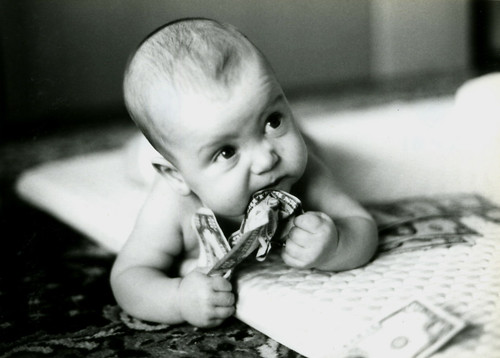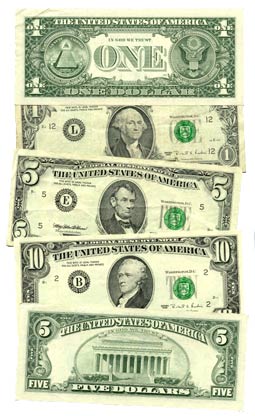What would your future-you have to say to you?
The no-pants guide to spending, saving, and thriving in the real world.
What would your future-you have to say to you?
From the comments here. The discussion is on how much it costs to have a baby. Edited for clarity.
 Babies” width=”270″ height=”200″ />
Babies” width=”270″ height=”200″ />
Actual birthing costs vary. We’ve had three kids over ten years and birthing costs have varied from $250 out of pocket to $8500. Our highest and lowest price births were 20 months apart. The highest price birth involved induced labor with an epidural. For the lowest out-of-pocket price, I added my wife to my policy before the birth, so she was double-covered. If one of your policies is less than ideal and there are multiple policies available, I recommend doing this. It saved us thousands. All told, If things go well, you could slide for as little as $1500 total.
For the highest price birth, we threw ourselves on the mercy of the finance department. They have a charity fund to pay the bills of the less fortunate. We qualified…barely. If you have a medical bill you can’t afford, ask if there is a grant or donation you can apply for. Always ask if there is some way the bill could be lowered.
Breast-feeding beats the heck out of formula, financially, but breast-feeding doesn’t always work. Ignore the boob-nazis who insist you are slowly killing your kid by using formula. I’ve got 3 kids, and each had different feeding issues.
Baby formula runs $19 for a big container at Sam’s Club, or a large percentage of your soul at most other big box stores. Formula alone will pay for your membership in under a month. For a big eater, that’s $20-30 per week. For a normal eater, 2-3 weeks. For planning purposes, assume $100/month in formula costs for the first six months, when food starts coming into play heavily. After that, the formula expense goes down, but not away for at least 6 more months.
Diapers are painful. Not just the smell–though that hurts, too, sometimes–but the expense. I currently have 2 in diapers; one is potty-training. Our monthly costs for diapers, now, are about $75. It was easily twice that when they were younger. Figure at least $100 per month in diapers. Unless your baby has irritation problems, go with cheap diapers. Leak-guard is a joke. If you are relying on leak-guard to keep the contents inside the diaper, you aren’t changing your baby often enough.
I couldn’t begin to guess at how much you’ll spend on baby clothes. I have never bought clothes for our kids. Whatever didn’t come free from friends and family walked into the house of it’s own volition, following my wife home from the store.
Toys are an almost purely voluntary expense. You’ll get as much as the kids needs free, as presents. You’ll go overboard and give the kids 10 times that, without realizing it. Don’t. For the first four to five months, its fingers and toes will be entertaining enough. After that, if there are more than about ten toys, it’s too many; the kid will never get attached to any of them. Keep it small. It’s better for the kids and the budget. Little kids prefer boxes to toys, anyway. Give the kid a shoebox instead of a Leapfrog. Really.
Portraits suck, too. If you have to get them done professionally, get a membership that covers sitting fees, and use coupons. I recommend JC Penney’s. Using judicious coupons and the membership, we get portraits for under $20.
Baby food is probably cheaper to make in a food processor, but you can’t beat the convenience of the little jars. If you watch sales, you can stock up affordably. Mix every meal with some rice or oatmeal mush to stretch it, without making it unhealthy. Depending on your kids, and how much you listen to the “experts”, this is a nonexistent expense before six months. Our kids started eating baby food in their second months, at least a little bit.
Babies are expensive. Don’t doubt that for a second, but ignore the polled averages when it comes to expense. Hand-me-downs, thrift stores, and good sales cut the expense a lot.
How do you save money and value with a baby in the house?
If you have not heard that Kim Kardashian has officially given birth to baby North West with rapper boyfriend Kanye West, you have probably been hiding under a rock.

Baby North was welcomed to the world several weeks early on June 15, and since then has been showered with thousands of dollars in gifts from family and celebrity friends like Beyonce and Jay-Z. Saying that baby North will never want for anything materialistic is putting it lightly, but how much does it truly cost for the average person to have a baby in today’s modern age? Here is a brief breakdown that will help you start saving before you start planning to have your very own precious baby.
While you probably will not have to pay for your prenatal and post-natal care out-of-pocket, the average insurance plan does come with out-of-pocket percentages that you must pay when you are hospitalized or when you visit the doctor. If you did not account for the medical bills when you were budgeting for baby, this is the first financial roadblock you will run into. You might not give labor in a luxurious suite like Kardashian, but it will feel like you did when you get the bill. Most parents report spending about $2000 out-of-pocket for the delivery and the hospital stay. This does not include the cost for co-pays for doctor visits. If you do not have insurance, expect to spend about $10,000 for a vaginal birth or $16,000 for a cesarean section, assuming there are no complications.
You will get some great gifts at your baby shower, but you still will spend money on the necessities. If you are not lucky enough to get $7000 gifts from your friends like Kanye and Kim, you should allot a budget for the big items first, and the basic daily necessities second. You will need a crib, a stroller, a car seat, and eventually a highchair, but these items are not as expensive as you might think. If you can pass up the designer brands, you can find great deals at consignment stores or retailers. Thrifty shoppers can purchase the must-haves like car seats, baby monitors, changing tables, cribs and strollers for $450 or less.
In addition to the immediate necessities, you will incur other regular expenses for diapers, clothing, wipes and childcare. Kim and Kanye may be guilty of buying $50 onesies, but you do not have to have custom Gucci clothing made for your little one. Remember that your baby will grow out of their infant clothing in a month or less. Accept hand-me-downs, and you can save quite a bit of money. Diapers, on the other hand, are a re-occurring expense that will not go away. Expect to spend at least $80 to $100 per month on diapers and wipes until your baby is potty trained. If you are not breastfeeding, allot about $100 per month for formula until your baby advances to baby food.
Kim and Kanye may have plenty of money to give Baby North whatever her heart desires, but new parents can raise a baby on a reasonable budget. It is difficult to put an actual number on how much it costs to have a baby, but being a parent is not cheap. Keep the fact in mind that love and affection is much more valuable than the material things. Consider the real costs of being a parent, and this includes lifestyle costs and monetary costs.

New Year’s resolutions are great, but what are you doing the rest of the year? As we roll into summer and we see the year’s halfway point approaching, it’s important to look at our goals and our progress and see if we’re on track for where we want to be in our lives.
Financially, now is the time to start preparing for the new year. Don’t be like most people and wait until December to think about it.
Here’s a place to start:
[ad name=”inlineleft”]
What are your financial plans for the rest of the year?
Update: This post has been included in the Festival of Frugality.
I don’t attach much importance to dreams. They are just there to make sleepy-time less boring. Last night, I had a dream where I spent most of my time trying to prepare my wife to run our finances before telling my son that I wouldn’t be around to watch him grow up. That’s an unpleasant thought to wake up with. Lying there, trying to digest this dream, I started thinking about the transition from “I deal with the bills” to “I’m not there to deal with it”. We aren’t prepared for that transition. Last year, we started putting together our “In case of death” file, but that project fell short. The highest priorities are done. We have wills and health directives, but how would my wife pay the bills? Everything is electronic. Does she know how to log in to the bank’s billpay system? Which bills are only in my name, and will go away if I die? Is there a list of our life insurance policies?
I checked the incomplete file that contains this information. It hasn’t been updated since September. It’s time to get that finished. Procrastinating is inappropriate and denial is futile. Here’s a news flash: You are going to die. Hopefully, it won’t happen soon, but it will happen. Is your family prepared for that?
The questions are “What do I need?” and “What do I have?”
First and foremost, you need a will. If you have children and do not have a will, take a moment–right now– to slap yourself. A judge is not the best person to determine where your children should go if you die. The rest of it is minor, if you’re married. Let your next-of-kin, your spouse keep it. I don’t care. Just take care of your kids! Set up a trust to pay for the care of your children. Their new guardians will appreciate it. How hard is it to set up? I use Quicken Willmaker and have been very pleased. Of course, the true test is in probate court, and I won’t be there for it. If you are more comfortable getting an attorney, then do so. I’ve done it each way. You can cut some costs by using Willmaker, then taking it to an attorney for review.
It’s a sad fact that often, before you die, you spend some time dying. Do you have a health care directive? Does your family know, in writing, if and when you want the plug pulled? Who gets to make that decision? Have you set up a medical power of attorney, so someone can make medical decisions on your behalf if you aren’t able? Do you want, and if so, do you have a Do-Not-Resuscitate order? Willmaker will handle all of this, too.
What’s going to happen to your bank accounts? I’m personally a fan of keeping both of our names on all of our accounts. I share my life and my heart, I’d better be able to trust her with our money. If that’s not an option, for whatever reason, fill out the “Payable on Death” information for your accounts, establishing a beneficiary who can get access to your money if you die. Do you want your spouse to lose the house or the car if you die? Should your kids have to miss meals? Make sure necessary access to your money exists.
Does anybody know what you have for life insurance? Get a copy of the policy and make sure your spouse and someone else knows what company holds it and how much it is worth.
Now, it’s time to make some lists. You need to gather account numbers and contact information for everything.
Non-financial information to list:
Now, take all of this information and put it in a nice, fat envelope and lock it in the fireproof safe you have bolted to the floor. Make a copy and give it to someone you trust absolutely. Make sure someone knows the combination to the safe or where to find the key.
Your loved ones will appreciate it.
Article written by money supermarket.
Sometimes the price you pay in-store for a product or service can change dramatically if you find the same product online, and in most cases the price in-store can be considerably higher. There’s nothing worse than getting home from a shopping trip thinking you have a bargain, until you realise that you could have saved a lot more had you have waited until you got home. Here are a few examples of things you should buy online to save money:
All movies, whether on DVD or Blu Ray format, are generally cheaper if bought online, it’s a fact that I have learned over the years. I’ve always found that searching the sites of film selling giants Amazon and Play, I can always find a movie that little bit cheaper and some considerably so. There are also some websites such as dvdpricesearch that compare prices of all of the big merchants for you; it’s a great way to save time and money.
In my opinion, the day of buying flights face to face is slowly on the decline, I seem to find considerably cheaper prices by searching online at home. I think the main reason for this is that, travel or holiday agents just do what we do, they search online for the best prices, and unless they have any exclusive deals then they will just be getting the same prices as us. I tend to use some online travel comparison websites that again do the searching for you; however, some work better than others so make sure you do your research.
I always purchase books online, whether in the standard physical format or in the form of an e-book. Books are just one of those things that always seem to be cheaper, with the likes of Amazon and Borders available online and offering fantastic discounts. There are also many websites that sell niche or rare books online that can be considerably cheaper than going direct to a book seller.
Auto insurance is one of those things that we all hate purchasing, but if you want to drive your vehicle on the road, then by law we have to spend our hard earned cash on it. Getting your auto insurance online can save you a lot of money. Using price comparison sites, you only have to fill in one form as if you’re applying for one quote, you will then be provided with a list of pricing options available to you.
Whether you are just buying a handset or if you’re looking for a monthly cell phone price plan, I always seem to find better deals online than I can in-store. Of course in-store you have the ability to try and haggle but I’ve found that the deals I get offered are never as good as those that I can find online. Online you can also search by provider website which is another great way to save money, and it would take you a lot of time to visit each store!
Jason’s note: I shop online a lot. I buy things that most people don’t realize are available online. An interesting counterpoint question: What should you buy in-person to save money?